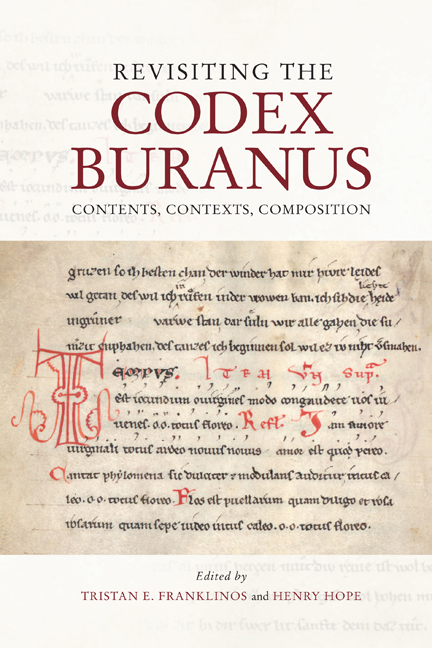Book contents
- Frontmatter
- Contents
- List of Illustrations
- Acknowledgements
- Abbreviations
- Dedication
- Introduction: The Codex Buranus – A Unique Challenge
- Chapter 1 A Modern Reception History of the Codex Buranus in Image and Sound
- Chapter 2 Parody in the Codex Buranus
- Chapter 3 Satire in the Codex Buranus
- Chapter 4 ‘Artes Amatorie Iam Non Instruuntur’: Learned and Erotic Discourse in the Carmina Burana
- Chapter 5 Classical Learning and Audience in the Carmina Amatoria: A Case-Study on CB 92
- Chapter 6 Rape, the Pastourelle, and the Female Voice in CB 185
- Chapter 7 Rethinking the Carmina Burana III: The Poetry of Peasants
- Chapter 8 Predestination and God’s Grace: The Salvific Architecture of the Religious Songs in the Codex Buranus
- Chapter 9 Revisiting the Plays of the Codex Buranus
- Chapter 10 Revisiting the Music of the Codex Buranus
- Chapter 11 Locating the Codex Buranus: Notational Contexts
- Chapter 12 Plurilingualism in the Codex Buranus: An Intercultural Reconsideration
- Chapter 13 Compilation, Contrafacture, Composition: Revisiting the German Texts of the Codex Buranus
- Afterword: multiformis armonia, scolaris symphonia
- List of Manuscripts
- Bibliography
- Index
- General Index
- Studies in Medieval and Renaissance Music
Chapter 5 - Classical Learning and Audience in the Carmina Amatoria: A Case-Study on CB 92
Published online by Cambridge University Press: 16 September 2020
- Frontmatter
- Contents
- List of Illustrations
- Acknowledgements
- Abbreviations
- Dedication
- Introduction: The Codex Buranus – A Unique Challenge
- Chapter 1 A Modern Reception History of the Codex Buranus in Image and Sound
- Chapter 2 Parody in the Codex Buranus
- Chapter 3 Satire in the Codex Buranus
- Chapter 4 ‘Artes Amatorie Iam Non Instruuntur’: Learned and Erotic Discourse in the Carmina Burana
- Chapter 5 Classical Learning and Audience in the Carmina Amatoria: A Case-Study on CB 92
- Chapter 6 Rape, the Pastourelle, and the Female Voice in CB 185
- Chapter 7 Rethinking the Carmina Burana III: The Poetry of Peasants
- Chapter 8 Predestination and God’s Grace: The Salvific Architecture of the Religious Songs in the Codex Buranus
- Chapter 9 Revisiting the Plays of the Codex Buranus
- Chapter 10 Revisiting the Music of the Codex Buranus
- Chapter 11 Locating the Codex Buranus: Notational Contexts
- Chapter 12 Plurilingualism in the Codex Buranus: An Intercultural Reconsideration
- Chapter 13 Compilation, Contrafacture, Composition: Revisiting the German Texts of the Codex Buranus
- Afterword: multiformis armonia, scolaris symphonia
- List of Manuscripts
- Bibliography
- Index
- General Index
- Studies in Medieval and Renaissance Music
Summary
In an overview of the amatory verse of the Middle Ages, Jan Ziolkowski offers a brief comment, representative of the communis opinio, on what he rightly calls the particularly pressing necessity of evaluating the sources of, and influences on, a literary tradition as fundamentally bound up in its own textuality as that of Latin poetry. From its earliest beginnings, through to the twelfth century and beyond the period with which we are concerned, Latin poetry had a ‘love of allusion’ which meant that ‘many Latin poems were fully comprehensible only to the cognoscenti’: to those who were able to recognise verbal allusions and references to myth, and to evaluate the constituent parts of a new poetic composition in the light of earlier literature. Ziolkowski outlines the challenge that faces scholars of medieval Latin, who ought to explore ‘the absorption and adaption’ of aspects of Classical, scriptural, and Christian texts into the literature of the Middle Ages, whilst not yielding to the ‘misleading temptation’ to read the latter as exclusively literary works (‘fenomeni squisitamente libreschi’), subject to the sort of Quellenforschung undertaken by students of literature with works of reference to hand. Ziolkowski's underlying concern is that the greater part of the audience of these poems would have encountered them not as written texts, but as performed pieces.
The tension inherent in some of the discussions surrounding the interpretation of medieval Latin verse, its intertextual and allusive relationship with its literary predecessors, and the ways in which this relationship affects the sort of (readerly?) audience we envisage, is one that has not been explored or negotiated satisfactorily in scholarly treatments of the poems that constitute the Codex Buranus. This is, to a great degree, because of the diverse nature of the collected carmina and the varied audiences – some learned, some apparently less so – for which these poems were composed, and, in part, because of the not infrequent attempts by scholars to comment on wider parts of the collection (as opposed to individual pieces) with the result that a consideration of the distinctions between different carmina, their respective source-texts (intended or otherwise), and their possible audiences (intended or otherwise) are overlooked.
- Type
- Chapter
- Information
- Revisiting the Codex BuranusContents, Contexts, Compositions, pp. 119 - 148Publisher: Boydell & BrewerPrint publication year: 2020



